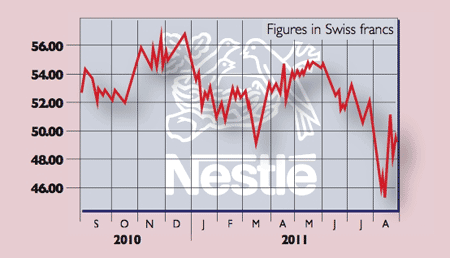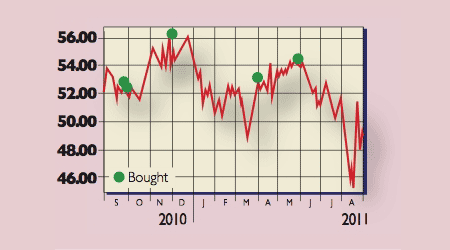Shares in focus: Nestlé
Nestlé is the world's largest manufacturer of food products, with a host of well-known brands. This makes the Swiss giant a solid defensive play. But with the very strong Swiss franc hurting exporters, is it the right time to buy? Phil Oakley investigates.
Get the latest financial news, insights and expert analysis from our award-winning MoneyWeek team, to help you understand what really matters when it comes to your finances.
You are now subscribed
Your newsletter sign-up was successful
Want to add more newsletters?

Twice daily
MoneyWeek
Get the latest financial news, insights and expert analysis from our award-winning MoneyWeek team, to help you understand what really matters when it comes to your finances.

Four times a week
Look After My Bills
Sign up to our free money-saving newsletter, filled with the latest news and expert advice to help you find the best tips and deals for managing your bills. Start saving today!
What is Nestl?
Nestl is the world's largest food and nutrition company. Its brands are split into five main areas: beverages (Nescaf coffee and Perrier, Vittell, and San Pellegrino waters); milk products; nutrition and ice cream (Milo, Nesquick, Powerbar, Skinny Cow); prepared dishes and cooking aids (Maggi, Buitoni, DiGiornio); confectionery (Kit Kat); and pet care (Purina and Friskies). Combined sales were CHF109bn in 2010.
What is the company's history?
Pharmacist Henri Nestl founded the firm in 1866 when he developed a formula milk product for infants. The company then expanded into condensed milk products. That led to its merger with Anglo-Swiss Condensed Milk Company in 1905. The early 20th century saw expansion across Europe, Asia and the US, and a move into chocolate. Nescaf coffee was launched in 1938. The post-war years saw rapid growth and the acquisition of prominent food brands such as Maggi, Findus, Crosse & Blackwell, Stouffer's, Carnation and Rowntree's. During the 1970s, Nestl attempted to diversify by buying a stake in L'Oral and purchasing Alcon Laboratories (sold in 2010). In recent years there has been increased emphasis on research and innovation (eg, Nestl Nutrition) and on selling complementary products such as coffee machines.
Who runs Nestl?
Paul Bulcke has been chief executive officer since 2008, having joined the firm as a marketing trainee in 1979. His total compensation was CHF10.6m in 2010. The previous CEO, Peter Brabeck-Letmathe, is chairman. James Singh is finance director.
MoneyWeek
Subscribe to MoneyWeek today and get your first six magazine issues absolutely FREE

Sign up to Money Morning
Don't miss the latest investment and personal finances news, market analysis, plus money-saving tips with our free twice-daily newsletter
Don't miss the latest investment and personal finances news, market analysis, plus money-saving tips with our free twice-daily newsletter
How is trading?
Results for the six months to June 2011 saw sales fall by 5% to CHF41bn with operating profit falling by 3.6% to CHF6.2bn. This was largely due to the strength of the Swiss franc. Good cost control partially offset higher raw material prices to protect operating margins. Excluding exchange rates, Nestl delivered organic sales growth of 7.5% with increases across all divisions. The performance of the water division was, however, disappointing increased competition in North America and high cost inflation saw profits fall by over 20%.
What's the outlook for Nestl?
The company is cautiously optimistic for the rest of 2011. While consumer confidence is subdued, it expects a combination of price increases and volume growth to deliver overall sales growth of 5%-6%. Ongoing cost savings are expected to offset input price increases and maintain margins. However, the strength of the Swiss franc (as a safe-haven currency) is a worry for all Swiss exporters and could remain a drag on reported sales and profits.
The analysts
Of the 44 analysts surveyed by Bloomberg, 19 say "buy", 21 "hold" and two "sell". The average price target is CHF54 9% above the current share price. Most bullish is Sanford C Bernstein with a target of CHF64. JP Morgan is most bearish with a target of CHF45.
Our view
Nestl is a solid defensive play with a decent dividend. However, it isn't cheap and, with the Swiss franc surging, investors should hold back for now.
The numbers

Stock market code: NESN
Share price CHF49.6
Market cap : CHF173.4bn
Net assets (June 2011) CHF52.5bn
Net debt CHF14.5bn
P/E (current year estimate) 16.2
Yield (prospective) 4.40%
Directors' dealings

Although Nestl does not have a formal share ownership policy for its directors, there have been plenty of purchases during the last year. CEO Paul Bulcke's is the most notable a purchase of nearly CHF5m shares on 29 March. It is encouraging to see that other directors have also invested significant amounts of money in the firm's shares. Purchase dates are shown in the chart, number of shares heldlisted below.
Director and shares held
P Bulcke: 124,672
J Singh: 5,219
JM Duvoisin: 12,822
N Nandikishore: 3,430
P Heynike: 18,317
J Bauer: 11,448
D Frick: 1,631
D Borel: 20,000
Get the latest financial news, insights and expert analysis from our award-winning MoneyWeek team, to help you understand what really matters when it comes to your finances.
Phil spent 13 years as an investment analyst for both stockbroking and fund management companies.
-
 Should you buy an active ETF?
Should you buy an active ETF?ETFs are often mischaracterised as passive products, but they can be a convenient way to add active management to your portfolio
-
 Power up your pension before 5 April – easy ways to save before the tax year end
Power up your pension before 5 April – easy ways to save before the tax year endWith the end of the tax year looming, pension savers currently have a window to review and maximise what’s going into their retirement funds – we look at how